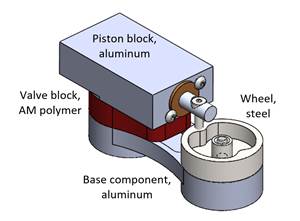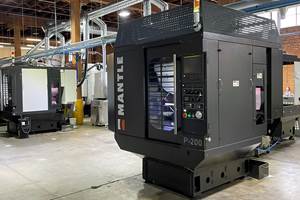Shops Differ on Cellphone Policies
Is the distraction of cellphone and device use on the shop floor a problem in your facility? What restrictions should govern cellphone use in the shop? Various shop owners and managers commented on this question in Modern Machine Shop’s LinkedIn group.
Share





ECi Software Solutions, Inc.
Featured Content
View More


Takumi USA
Featured Content
View More
Hwacheon Machinery America, Inc.
Featured Content
View More



Autodesk, Inc.
Featured Content
View MoreCan you remember a time when the only telephone in the production area was a landline shared by the shop employees? Today, practically any production employee is likely to have a sophisticated communication and media device in his or her pocket.
On Modern Machine Shop’s “Top Shops” network on LinkedIn, I began a conversation by asking shop owners and managers about their shops’ policies regarding employee cellphone use on the shop floor. Should employees be free to use their data devices, or should there be restrictions?
Here is some of what the participants in the LinkedIn discussion had to say….
Michael Sheridan, owner, Industrial Machine: “We allow the limited use of cell phones during work hours, meaning calls of a minute or two a couple of times per day. We do not permit texting or game playing, and no earphones are permitted. Because the employees are adults who consider these rules common sense, no one takes advantage of them.”
Amy Petersen, owner (now retired), Belding Tool and Machine: “At our plant, cell phones are kept in the employee lockers. Employees are free to check for calls, emails and texts during breaks and lunch period. In case of emergencies, they instruct family members to call the main office so they can be paged. Works great for us!”
John Baklund, owner, Baklund R&D: “We allow employees’ phones to be on, but we have a policy of only calling, texting or emailing members of our BRD team. This allows for quick and efficient workflow. Everyone appreciates this—they can still see texts from friends or family. We discuss the distraction factor often, so as to teach people how to structure their response to this new technology appropriately. We have young people who only have a cell phone, no land line. Some have thanked us for talking about this; it has helped them in life outside of work.”
A manufacturing engineer (I was unable to get his permission for a direct quote) commented that there had certainly been cell phone problems at his plant, but noted also that cell phones are handy. Shopfloor personnel can text him when they need him, saving them from time-wasting trips to the office area.
A job shop owner (ditto) said he had a flat rule about no cell phones in the shop. Employees leave them in their lockers and can use them on break. The lead carries a wireless handset for the main line in case of emergency.
Adam Govoni, machine shop supervisor, Vander-Bend Manufacturing: “It is clear that there are many policies regarding cell phones. Shop cultures will vary. The key is a balance between safety and productivity with a view toward employee satisfaction. I think we have the most productive crew in our region in part because of an attitude of mutual respect throughout the team.”
Mark Kenworthy, owner, Kenworthy Machine: “If you have an employee who will abuse having a cell phone at work, to the extent that the employee isn't working productively, then the issue isn't the cell phone policy. The issue is that employee's attitude. Either the attitude needs to change or that employee needs to be encouraged to find employment elsewhere. Otherwise, that person’s behavior will negatively affect the attitude and productivity of the rest of your team.”
One of the shop owners who got me interested in this question in the first place was Matt Guse of MRS Machining. He ultimately decided to implement a shop-wide cell phone ban. Read about how that went.
Related Content
Solve Worker Shortages With ACE Workforce Development
The America’s Cutting Edge (ACE) program is addressing the current shortage in trained and available workers by offering no-cost online and in-person training opportunities in CNC machining and metrology.
Read MoreFinding the Right Tools for a Turning Shop
Xcelicut is a startup shop that has grown thanks to the right machines, cutting tools, grants and other resources.
Read MoreWorkholding Fixtures Save Over 4,500 Hours of Labor Annually
All World Machinery Supply designs each fixture to minimize the number of operations, resulting in reduced handling and idle spindle time.
Read MoreIn Moldmaking, Mantle Process Addresses Lead Time and Talent Pool
A new process delivered through what looks like a standard machining center promises to streamline machining of injection mold cores and cavities and even answer the declining availability of toolmakers.
Read MoreRead Next
Registration Now Open for the Precision Machining Technology Show (PMTS) 2025
The precision machining industry’s premier event returns to Cleveland, OH, April 1-3.
Read More5 Rules of Thumb for Buying CNC Machine Tools
Use these tips to carefully plan your machine tool purchases and to avoid regretting your decision later.
Read MoreBuilding Out a Foundation for Student Machinists
Autodesk and Haas have teamed up to produce an introductory course for students that covers the basics of CAD, CAM and CNC while providing them with a portfolio part.
Read More

































.jpg;maxWidth=300;quality=90)

.jpg;maxWidth=300;quality=90)








